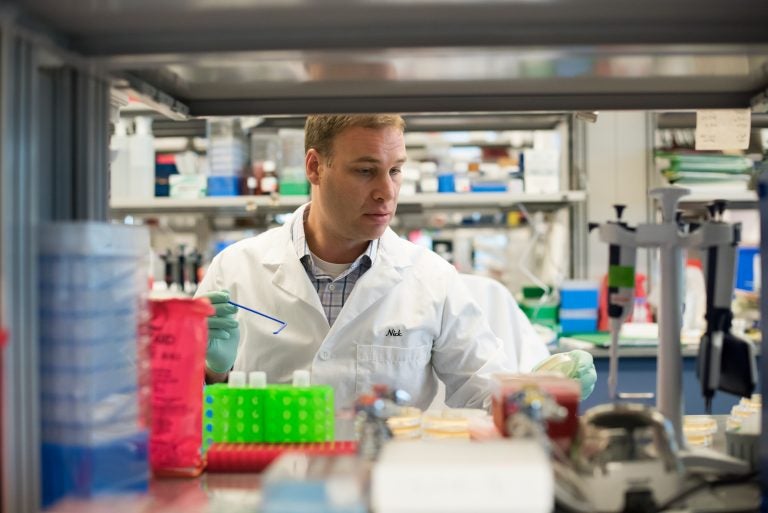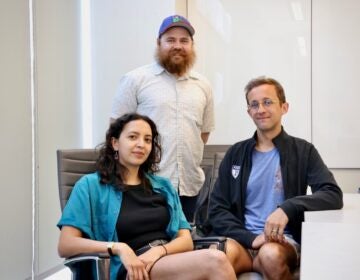FDA panel backs gene therapy from Philly's Spark Therapeutics
The therapy can help children with a rare genetic eye disorder see better. It comes after two other recent significant developments in gene therapy.
Listen 0:00
A research scientist in the Spark Therapeutics laboratory (Spark Therapeutics)
A new gene therapy to treat a rare eye condition that can leave children blind has been recommended for approval by a Food and Drug Administration committee.
The therapy from Spark Therapeutics, a Philadelphia-based company, could represent an important moment in a medical field that has struggled in the past, experts said.
Some children are born with rare eye disorders that make it hard for them to see because the cells in their eyes can’t make a certain protein.
The genes in the cells are instructions, telling the cells how to make those proteins, explained Katherine High, head of research and development at Spark Therapeutics.
“The cell is making all the other proteins,” she said. “It just can’t make that one because it’s got a mistake in the instructions.”
The gene therapy uses a virus to carry the gene, with the correct instructions, to the cells so they can make the missing protein that will improve vision.
A disclosure, the CEO and co-founder of Spark, Jeffrey Marrazzo, is the son of WHYY CEO Bill Marrazzo.
Kristin Smedley is the mother of two boys in Bucks County who have a different, but similar, inherited eye disease. She was at the FDA committee meeting to testify about the family’s experience.
“As a mom, October is usually a very exciting month for kids … (my boys) can’t run with their friends from house to house because they can’t see at night,” she said. “Everyone’s picking out costumes … it just keeps gnawing at me that, this one night, it’s in your face just how blind they are.”
Even though this new therapy won’t directly benefit her sons, Smedley said she is very happy with the committee approval.
“Everybody that knows me knows how hard it was for me to not jump up and have all kinds of confetti flying around … I was just trying to be very businesslike and appropriate,” she said. “Tears leapt out of my eyes.”
Progress on this gene therapy could benefit the field as a whole, said Smedley who started a foundation that funds various research projects —including one at the University of Pennsylvania —to study the gene mutation that led to her sons’ blindness.
The FDA still must approve the therapy, but committee approval is a promising step forward, said David Williams, the chief scientific officer of Boston Children’s Hospital.
He wasn’t involved in this particular gene therapy, but he’s also working on others.
“There’s a great deal of excitement now in the field that we’re through this period of downsizing and now in a period of … expanding interest,” he said. “I don’t mean to be hype-ish, but, for the field, it is an important landmark recommendation.”
Gene therapy has had its ups and downs in the past, including a 1999 case at the University of Pennsylvania where a patient in a clinical trial died, Williams said.
That scared scientists and companies away from gene therapy for a while, but now the field is making a bit of a comeback with several significant recent developments.
In August, the FDA approved a therapy that uses genetically modified immune cells from patients to attack their cancer, which the FDA hailed as a “historic action.” Earlier this month, Williams’ team published clinical trial results in the New England Journal of Medicine showing how a gene therapy treatment effectively halted progression of a fatal brain disease.
But Williams cautioned that much work remains.
For instance, he said, these gene therapy products are harder to make than conventional drugs, and there’s a bit of a backlog right now at the places that can make the viruses needed to carry them.
The FDA is expected to announce its decision on the treatment by mid-January.
WHYY is your source for fact-based, in-depth journalism and information. As a nonprofit organization, we rely on financial support from readers like you. Please give today.





